Text
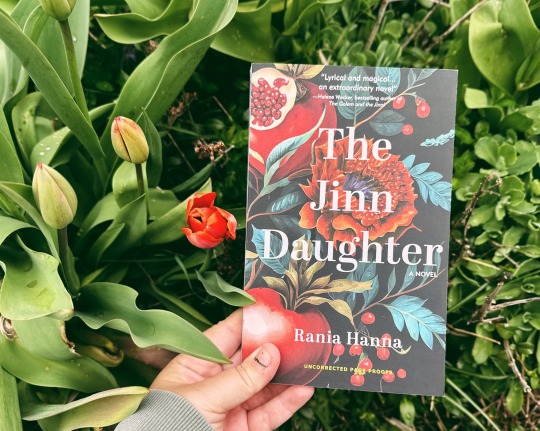
The Jinn Daughter by Syrian-American author Rania Hanna is an emotional, lyrical story rooted in Middle Eastern myth. Nadine is a jinn who each day, must gather the pomegranate seeds of those who have died and eat them, telling their stories in the process and letting them proceed into the afterlife. It is a heavy task, and she isn't always honest with her daughter, Layala, about its burdens. But when Kamuna, Death herself, comes to them and tells them that she needs an heir, and that she wants Layala, Nadine will need to draw on all her magic and strength to try and keep her daughter safe.
This book is a rich bold story grounded in the desperation of a mother to keep a young girl sheltered and safe from a world that hates the jinn and all things magic. The plot unspools in a satisfyingly slow weave, betrayals, violence, and disappointments flowing off the page. I enjoyed the micro tales told within the book itself, small folk tales for the characters to share with each other. A sequel is maybe teased, but I wasn't sure—I think the door was left intentionally open without leaving too many loose threads—so it stays a solid standalone. Not perfect, but consistently enjoyable and I highly recommend the read.
Content warnings for death/grief, child death, violence, suicidal ideation/suicide.
12 notes
·
View notes
Text
Reading and walking in the Daintree rainforest (watch out for spiderwebs!)
#daintree#daintree rainforest#bookworm#reading and walking#bookish love#reading while wandering#reading while wandering australia
4 notes
·
View notes
Text
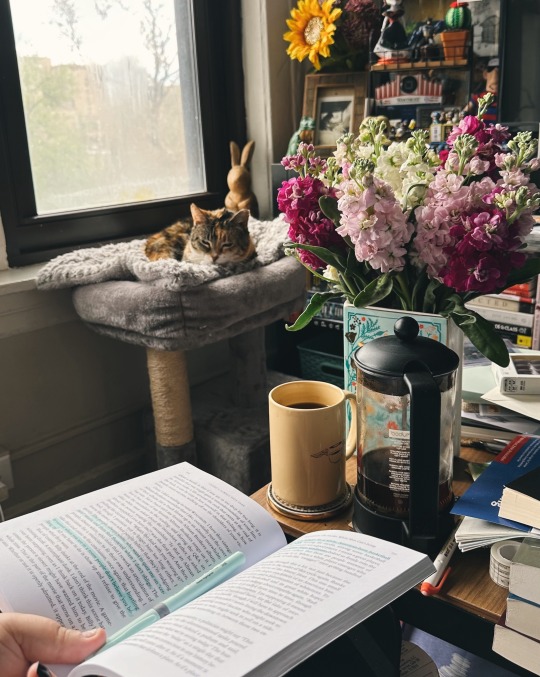
Cozy.
47 notes
·
View notes
Note
wie kannst du so sorglos den blumendüften frönen, während alles beim satan ist- glaubst du nicht, das die masse der armen dir irgendwann den laib zerreist
Google translate says this means "How can you indulge in the scents of flowers so carelessly while everything is with Satan - don't you think that the masses of poor people will tear your loaf at some point"
I have no answer to this except that nothing about appreciating the small beauties of the world is careless, it is a beautiful thing that I do not take lightly.
4 notes
·
View notes
Note
this is completely out of the blue but your mug in the tale of genji photo. i need it. is it possible to point me towards a store or maker it came from?
Hi! I've gotten this question a couple times - it was made by Callahan Ceramics. They're currently in a much different place than they were, they got caught up and too popular and had to back off to get back to making the true art they loved, but they're still selling many stunning pieces.
1 note
·
View note
Note
Favourite collection of short stories?
Sorry I missed this! I have a couple all-timers:
Things We Lost in the Fire by Mariana Enriquez tr. McDowell
Smoke & Mirrors by Neil Gaiman
Her Body and Other Parties by Carmen Maria Machado
Ficciones by Jorge Luis Borges
The Shell Collector by Anthony Doerr
But here are some others that are by slightly lesser known / newer authors to check out! -
Underrated fantasy/magical realism:
The Rock Eaters by Brenda Peynado
Never Have I Ever by Isabel Yap
Jewel Box by E. Lily Yu (recent release)
Sooner or Later Everything Falls into the Sea by Sarah Pinsker
When the Hibiscus Falls by M. Evelina Galang
Vampires in the Lemon Grove by Karen Russell
15 notes
·
View notes
Text
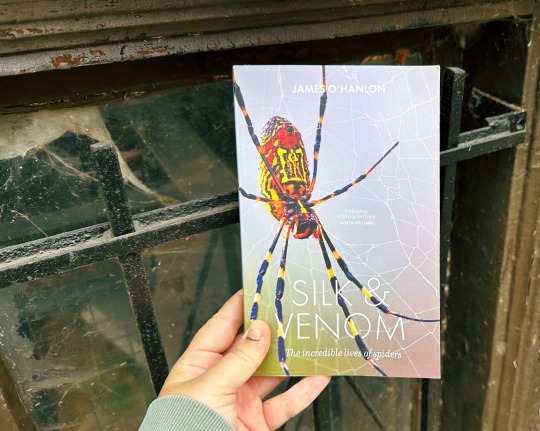
Australia made me fear spiders less. Yes, I saw lots of way-too-big, colorful spiders, but they were all 'over there.' One was in a bathroom corner. But not one came near me, and it was honestly a bit of exposure therapy of sorts. So when I was in Brisbane, I picked up Silk & Venom: The Incredible Lives of Spiders to learn more about how spiders were cool.
This book definitely taught me that spiders are awesome. Diving bell spiders live in underwater nests by using air bubbles. Spiders can use electromagnetic fields to balloon rapidly away from the ground and find new territory. Spiders live at the top of the Himalayas. Spider silk is biocompatible and may be the key to future implants, healing, and even chronic pain treatment. Spiders are a fellow victim of widespread doctor misdiagnosis, because an astounding number of "spider bites" are actually due to something else. Some spiders can change color, others pretend to be ants (very successfully), and spiders make fascinating traps out of their webs. Hanlon's love of spiders comes through wonderfully, and his writing is accessible and fun.
I do think that James O'Hanlon could do some self-examination work on his approach to people's fear of spiders. His dismissive, baffled tone risks alienating the very people that he wants to self-examine. There are a lot of other reasons people might be scared by spiders that he doesn't explore (any Naked & Afraid episode will show you crawly many-legged things are mostly very bad for humans—ants, ticks, cockroaches, millipedes). His mystified lack of empathy will simply turn off many readers. He is 100% right that storytelling is the key to vilifying or saving species (think about how we talk about sharks now vs. after Jaws first came out), and so it's worth pointing out that his storytelling comes off as condescending in many of these passages. Particularly (unfortunately) in two anecdotes that feature women or girls being frightened by spiders, which is a big, big issue (I promise men hate spiders at least as much as girls do).
So ultimately, a good read, but Hanlon could take a lesson from his own book and think about the message sent when stories are told in a certain way.
#spider & venom#james o'hanlon#science reads#spiders#nonfiction#my book reviews#reading and wandering#reading and wandering australia
15 notes
·
View notes
Text

It’s starting to rain in Chicago and I’m thinking of the sun in Bondi. 😍
#bookworm#book blog#bookish love#bondi beach#australia#reading while wandering#reading while wandering australia
27 notes
·
View notes
Text
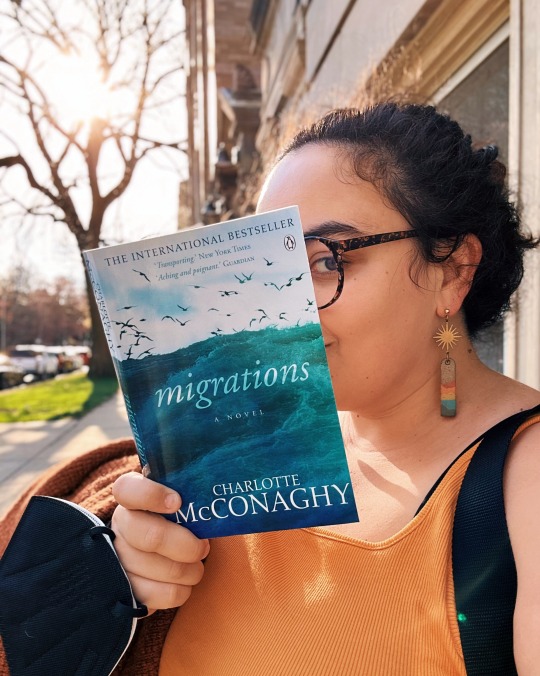
I wanted to reread Migrations by Charlotte McConaghy earlier this year, but then I discovered that she was Australian, and so I saved it until my trip, buying a new copy with a gorgeous ocean-rooted paperback cover from Better Read Than Dead, a bookstore in the Sydney suburbs. I didn't get to it while still down under, but I decided to start my reread earlier today, still infected with a drive for conservation that the reefs, rainforest, and zoos instilled in me.
On reread, the book made me cry several times over. When I was first assigned the list "Books that Break Your Heart and Put It Back Together Again" for Book Riot, this novel was the first I thought of. The swings of despair and hope in a world where nearly all animals have gone extinct, in a world where our unreliable anti-heroine is herself swinging between purpose and delusional loss, makes for an unforgettable novel. I am still so, so in love with this book on reread, enough so that I couldn't help but stay up well into the night to finish it, and loving it the 2nd time around means it officially passes into my favorites list.
Content warnings for suicidal ideation/suicide, violence, mental illness, sexual assault attempt, violence.
#migrations#charlotte mcconaghy#australian lit#rereads#bookish love#bookworm#my book reviews#reading while wandering#reading while wandering australia
6 notes
·
View notes
Text
I loved visiting Avid Reader and its partner shop in Brisbane! Since it was near the end of my trip, I was finally able to commit to the chunker of Carpentaria by Alexis Wright, and l also got a crocodile pin and a book about spiders!
#avid reader#bookstores#australia bookstores#bookworm#beautiful bookstores#reading while wandering australia#reading while wandering
19 notes
·
View notes
Text
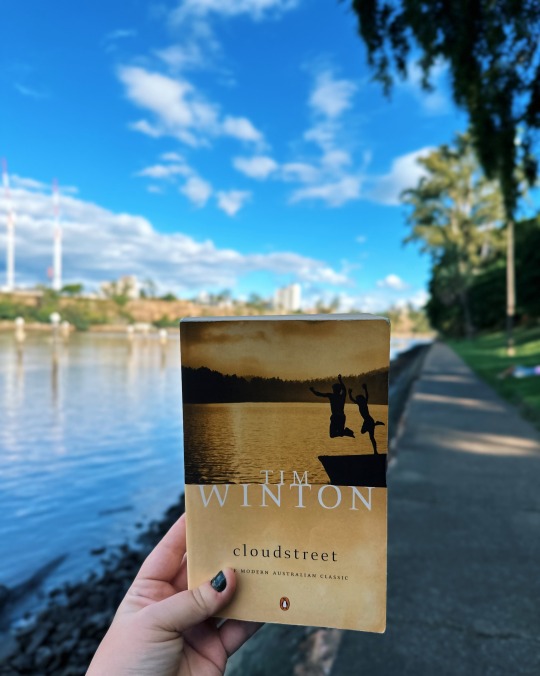
I read Cloudstreet, a modern Australian classic by Tim Winton about two down-on-their-luck families who end up living in the same big ramshackle, haunted home, beginning in Brisbane (someone had misinformed me and told me it was set there) and then throughout the long plane ride home. Now, I liked a lot about it. I liked the surrealist touches, the premonitions and warnings and dreams. I liked the flinty Oriel, a mother and a hard worker, and her soft husband Lester; I liked the journey of young Quick. It's a family epic about two families shaped by tragedies. It's compelling even when sometimes long-winded.
But ultimately, I really struggled with the core character: Fish. The Lamb family's world changes when a tragic accident leaves the favorite son, Fish, mentally disabled. Other characters' stories and journeys are built upon this tragedy. But he also has seemingly magical abilities. He "knows" things, he can talk to the family pig and to the ghosts of the house, he appears to characters in dreams and some version of him is narrating our novel. He is described too often in a very dehumanizing way (was a scene of his brother sobbing as he cleans Fish up after he shit himself necessary to the plot?) and Rose's crush on him becomes a ridiculous childhood fantasy transferred onto his brother instead.
Most upsettingly (spoilers), the ending of the two families, the two mothers, seeming to heal and come together in the house, seems to hinge on his suicide. It's been hinted at throughout the book—when Fish almost drowned, but was resurrected, he felt disappointed to be taken from the water, as if there was something wrong in his rebirth, and he's craved the water ever since. His purposeful drowning is written almost as a correction, a completion of what had been hanging over the Lamb family all this time. It is a release for him and his family—which is extremely troubling.
We can add to that a mysterious black man/spirit/ghost who shows up at random times solely to hand out sage advice or warning. One of the ghosts of the house is an indigenous girl who was killed in the midst of a colonizing, imperialist re-education project. These brown presences haunt the families of Cloudstreet, perhaps a metaphor for colonization's legacies, but mostly an uncomfortable magical-negro style presence instead. The women are...ok, Oriel being the best written of them. The male characters are interesting and complex but they too have their holes.
Ultimately, if it had had a different ending for Fish, I might have been able to better balance the flaws of this book with its successes, but it's impossible in the end. A shame, because a lot in this book was really promising.
Intense content warnings for ableism, suicide. Warnings also for violence, disordered eating, child death, substance abuse/addiction.
#cloudstreet#tim winton#bookworm#book blog#book love#my book reviews#reading while wandering#reading while wandering australia
7 notes
·
View notes
Text

I miss Australia. 🩵
8 notes
·
View notes
Text
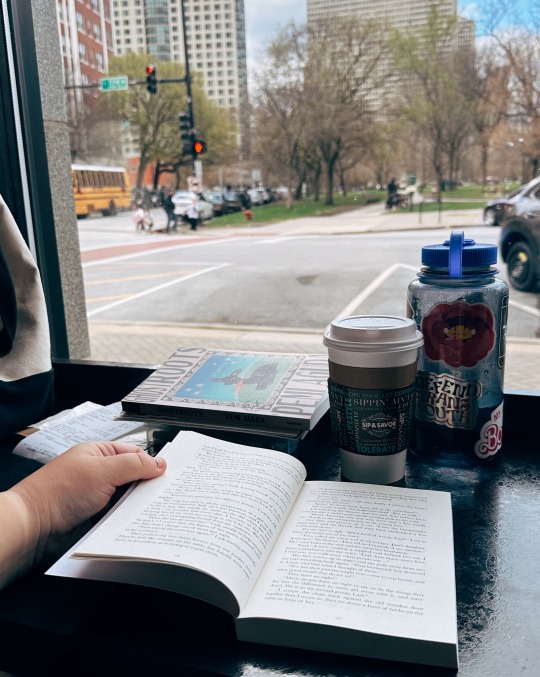
One of the things that’s beautiful about travel is what happens when you get back: you tend to see your city with that same enduring tourist mentality.
“Ooh, what was that bird? Oh, it’s spring here! Look at that bluejay! Wait, what is the name of that butterfly? Ok but who has the BEST cinnamon roll in Chicago? Ok but lowkey we DO have good public transit. I love this house! We do love this style here don’t we?”
It reminds you to bring your tourist hyper curiosity to the place you love and live in, and that’s always a magical thing.
41 notes
·
View notes
Text

In The Yield by Tara June Winch, August Gondiwindi is returning home from London to attend her grandfather's burial, returning after a decade to their home beside the now dried-up river. She finds out that her grandmother is soon to lose her home, the town's land sold to a mine, and discovers that her grandfather was writing a book—a 'dictionary'—about his life, the Wiradjuri language, and his people, a book that could help her prove that they have a cultural history and right to the land. But first she'll have to confront some truths and memories from her childhood that she had hoped to forget.
Albert "Poppy" Gondiwindi has a powerful voice that his granddaughter can't match. But together, the two of them give us a story of heritage, generational trauma, and incomprehensible loss. The novel isn't perfect. The central plot line concludes a little too cleanly, characters moving in fairly predictable lines, and August's chapters could have been tightened, as they could sometimes drag. But the novel about aboriginal history, disempowerment, traditions, and beliefs was ultimately well worth the read. Thanks to Elizabeth Books in Newtown, NSW, for my copy; I read it alongside the Great Barrier Reef and under the shade of the Daintree rainforest.
Content warnings for anti-indigenous sentiment and violence, substance abuse, sexual assault, child abuse, racism.
#the yield#tara june winch#aboriginal australian#aboriginal culture#australian lit#reading while wandering australia#reading while wandering#my book reviews
6 notes
·
View notes
Text


I reread The Thorn Birds by Colleen McCullough on the plane ride to Sydney, trying my best to hurry through the second half as I lagged somewhat through it, finally finishing it on our first day in wet, hot Queensland. I saw sugarcane fields and galahs and saw a plaque to McCullough on a Sydney poet's walk.
This book continues to be good, compelling, and difficult to put down, a really rooted family epic of station living, sheep, the tragic turns of life, and the awe and terror of nature. On reread it was much harder to ignore Ralph's grooming of Meggie: it is explicit and clear, and Ralph tortures himself plenty about what it means for him as a priest but little about her comparative youth. So I think it's safe to say that readers should be well-prepared for the primary romance of the novel to be a problematic one of grooming and an imbalanced age gap, framed as a "pure" star-crossed romance.
Still, the book, particularly its front half, is intensely powerful as a family epic. The characters feel dense and real. I've always been minorly unimpressed by the last chunk, and believe it could have ended much earlier and felt more satisfying. But I loved reading once again about the difficult life of this huge farm, the twists and turns of fortune, the flinty steel within Meggie and her mother. It's a rich, big family epic that I enjoyed on reread—and I should say, the twists took me just as much by surprise this time around.
Content warnings: grooming, age-gap relationship, body horror, child death, misogyny, animal death, violence.
#the thorn birds#colleen mccullough#australian lit#classics#historical fiction#my book reviews#reading while wandering#reading while wandering australia
5 notes
·
View notes
Text
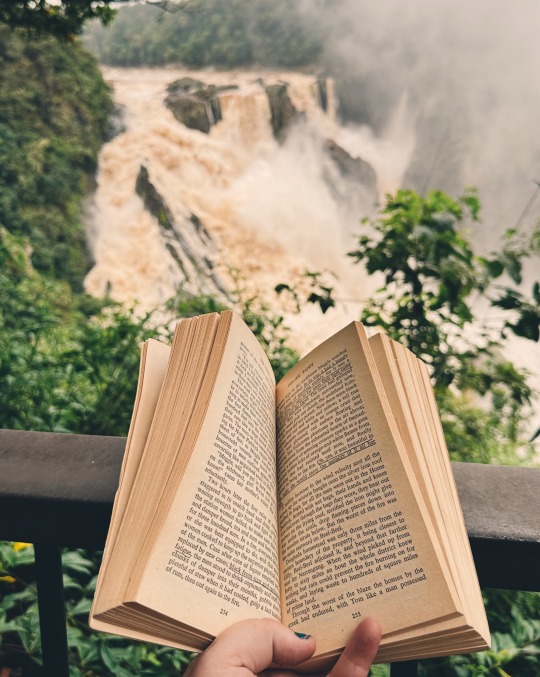
Flashback to reading on the train up to Barron Gorge.
#barron gorge#bookworm#bookish love#book blog#australia travel#reading while wandering australia#reading while wandering
32 notes
·
View notes
Text
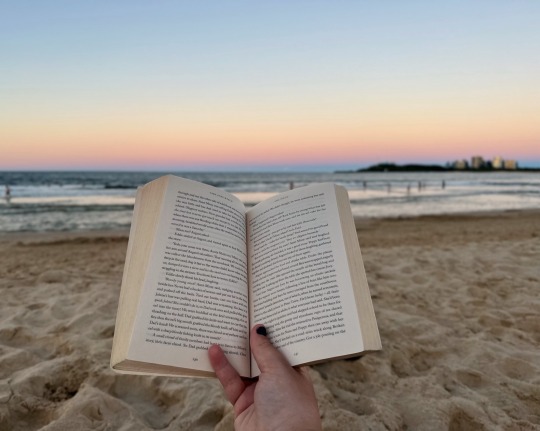
So deeply not ready for this trip to go over. This was a dream trip years and years in the making, and it lived up to and surpassed all its expectations. (For one, we were not attacked by any spiders.) Post-trip depression is so real! What do you mean I have to go back to real life?? At least I’ll see my precious soft cat at the end of these long, long flights.
#bookworm#wanderlust#travel post#travel blog#bookstagram#reading while wandering#reading while wandering australia
53 notes
·
View notes